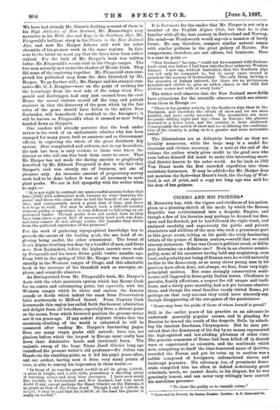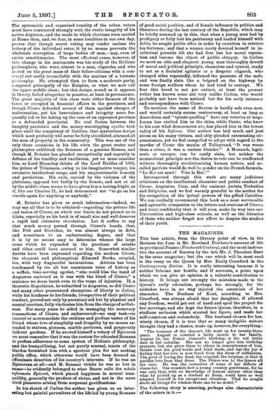CICERO AND HIS FRIENDS"
M. Boissiun has, with the vigour and vividness of his nation. given us a pleasing sketch of the mode by which the Roman Republic was revolutionised into a despotic Empire, and though a few of his theories may perhaps be deemed too fine- spun and far-fetched, yet he has followed the right track, and analysed carefully and sagaciously the public and private characters and abilities of the men who took a prominent part in this great event, taking as his guide the truly fascinating letters of the prince of Roman orators,—would that we could also say statesmen. What was Cicero's political creed, or did he ever determine on a definite one P Born in an obscure munici- pality, none of his ancestors having held any magistracy, even local, and probably not being of Roman race, he would naturally incline to the democracy, as so many clever young men in his position have often done, not always, we fear, from very high- principled motives. But some strongly conservative senti- ments still lingered in these petty Italian towns. Obedience to parents, family affections, a respect for old usages and tradi- tions, and a fairly pure morality, had not yet become obsolete there, and though the rural families rarely visited Rome, yet perhaps on that very account they could more sincerely say, though disapproving of the arrogance of the patriciate-
" Rome may bear the pride of those of whom herself is proud."
Still, in the earlier years of his practice as an advocate be undertook generally popular causes, and in pleading for Roscins he braved the wrath of the despotic Stills by attack- ing his insolent freedman, Chrysogonus. But he soon per- ceived that the democracy of his day by no means represented the high-spirited and law-abiding plebeians of olden time. The genuine commons of Rome had been killed off in distant wars or expatriated as colonists, and the multitude which now, arrogating to itself the time-honoured name of Quirites, crowded the Forum and put its votes up to auction was a rabble composed of foreigners, enfranchised slaves, and bankrupt peasants. His advocacy, too, of prominent demo- crats compelled him too often to defend notoriously great criminals, much, we cannot doubt, to his disgust, for he was genuinely honest, and can never very willingly have exerted his matchless powers- " To clear the guilty or to varnish crime."
• Cicero and his Friends. By Garton Maier. London 3 A. D. lanes and Co.
The systematic and organised venality of the urban voters must have contrasted strongly with the rustic integrity of his native Arpinum, and the mode in which elections were carried at Rome then, and, we fear, in some localities in our own day, proves that though secret voting may render useless the bribery of the individual voter, it by no means prevents the wholesale corruption of large bodies of men,—nay, even of entire constituencies. The most effectual cause, however, of this change in his sentiments was his study of the Hellenic philosophers, who were, almost to a man, oligarchs, and who looked on the great mass of their fellow-citizens with a con- tempt not easily reconcilable with the maxims of a humane philosophy. He attempted then to form a moderate party, composed principally of the Knights, or what we now call the upper middle class ; but this design, sound as it appears in theory, failed altogether in practice, at least in permanence. The great majority of this class were either farmers of the taxes or occupied in financial affairs in the provinces, and though Cicero defended several of them against charges of malversation, yet his benevolence and integrity more fre- quently led to his taking up the case of an oppressed province or a defrauded provincial. No real fusion between the haughty patriciate and the money-worshipping equites took place until the conspiracy of Catiline, that mysterious design which most probably will never be fully elucidated, alarmed all the men of property in the community. This was one of the only three occasions in his life when the great orator and philosopher exhibited the firmness of a genuine Roman, and though M. Boissier has pleaded energetically and cogently in defence of his timidity and vacillation, yet we must consider him, as Lord Macaulay thinks of the Lord Halifax of 100, the prince of Trimmers, owing to his imaginative temper, his extensive intellectual range, and his unquestionable honesty and patriotism. His exile, carried by the violence of the plebeians, opposed but feebly by the Senate, and not at all by the middle class, seems to have given him a lasting fright, as if, like our Charles II., he had determined not "to go on his travels again for anything or anybody."
M. Boissier has given us much information—indeed, we may say all that is to be obtained—regarding the private life and tastes of Cicero, on which our limits do not permit us to dilate, especially as his book is of small size and well deserves a rapid and extensive circulation. Let it suffice to say that much money passed through Cicero's hands, that, like Pitt and Sheridan, he was almost always in debt, and sometimes to an embarrassing degree, and that it is by no means easy to determine whence the large sums which he expended in the purchase of estates and villas could have accrued to him. Somewhat similar doubts have been expressed regarding the modern Cicero, the eloquent and philosophical Edmund Burke, coupled, too, with very disgraceful insinuations. Atticus has been condemned by the all but unanimous voice of history as a selfish, time-serving egotist, " who could kiss the hand of Augustus embrued as it was with the blood of Cicero," a sentence we deem harsh even to the verge of injustice. If, a theoretic Republican, he submitted to Augustus, so did Cicero and many other pronounced champions of liberty to Julius, while his kindness to his friends, irrespective of their political conduct, proved not only by pecuniary aid but by physical and mental exertion, fully vindicates him from the charge of selfish- ness. For many years he aided in managing the monetary transactions of Cicero, and endeavoured—no easy task—to control or accommodate the reckless and profuse tastes of his friend whose love of simplicity and frugality by no means ex- tended to statues, pictures, marble porticoes, and gorgeously laid-out gardens. If he avowed himself a votary of Epicurus we must remember that it was the custom for educated Romans to profess adherence to some system of Hellenic philosophy, and the tranquillising, but not purely sensual, tenets of the Garden furnished him with a specious plea for not seeking public office, which otherwise would have been deemed an effeminate desertion of his country's interests. If he was an Epicurean at all—and M. Boissier thinks he was so but in name—he evidently belonged to what Bacon calls the s chola reformats. Epicuri, which placed happiness in mental tran- quillity, generally the product of virtue, and not in the more vivid pleasures arising from corporeal gratifications.
In his sketch of Cielius the author has given us an inter- esting but painful portraiture of the life led by young Romans of good social position, and of female influence in polities and literature during the last century of the Republic, which may be briefly summed up in this, that when a young man had by profligacy or folly lost his patrimony and loaded himself with debts, he sought public office in order by extortion to retrieve his fortunes ; and that a woman rarely devoted herself to in- tellectual pursuits till she had first lost her moral reputa- tion and become the object of public obloquy. In Cronus we meet an able and eloquent young man thoroughly devoid of moral and political principle, shameless and cynical, ready to act as a Socialist agitator or a despotic oligarch, who• changed sides repeatedly, inflamed the passions of the mobs and was finally slain like a brigand on the highway by some foreign soldiers whom he had tried to corrupt. We fear this breed is not yet extinct, at least the present writer has known some not very unlike Cmlius, who would probably not have been noticed but for his early intimacy and correspondence with Cicero.
To mention the name of Brutus is hardly safe even now, and would certainly arouse controversy, at least as long as Anarchism and " tyrant-quelling " have any votaries at large. Lucan has exalted him to the skies, while Dante, who knew to his cost what democracies are, has placed him in the lowest valley of his Inferno. Our author has laid much and just stress on his many virtues, and ably pleaded extenuating cir- cumstances, yet we feel compelled to adopt with regard to the murder of Caesar the maxim of Talleyrand, "It was worse than a crime, it was a useless blunder." A Monarch, legiti- mate or usurper, can be easily slain, but neither the monarchical principle nor the desire to rule can be eradicated without thoroughly revolutionising human nature, and so- called patriots would do well to ponder on the French formula., "Le Roi est mort! Vive le Roi !"
Interspersed through this work are many judicious criticisms on the intellectual character and public conduct of Caesar, Augustus, Cato, and the eminent jurists, Trebatius and Salpicius, and we feel warmly grateful to the author for his recognition of the lyrical powers of the gifted Catullus. We can cordially recommend this book as a most serviceable and agreeable companion to the letters and orations of Cicero, and trust confidently that it will soon make its way into our Universities and high-class schools, as well as the libraries of those who neither forget nor affect to despise the studies of their youth.







































 Previous page
Previous page